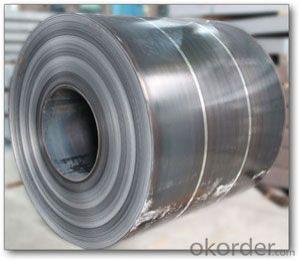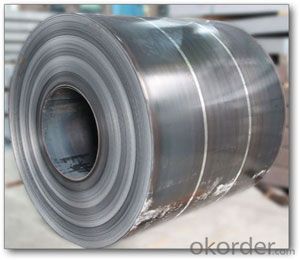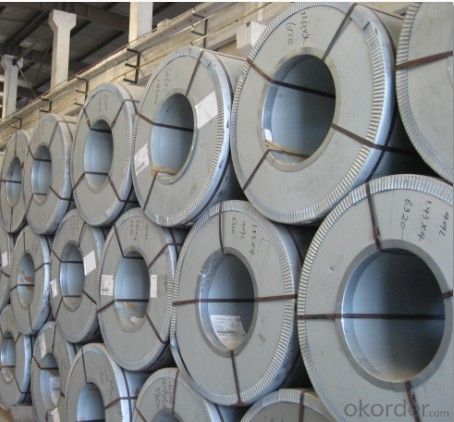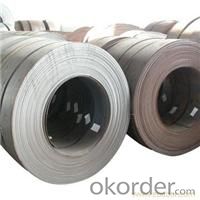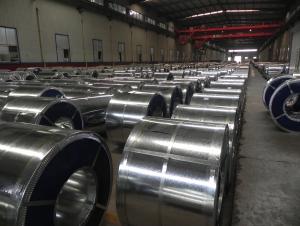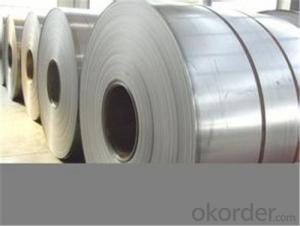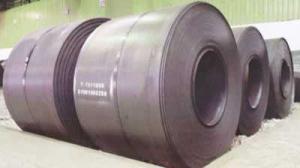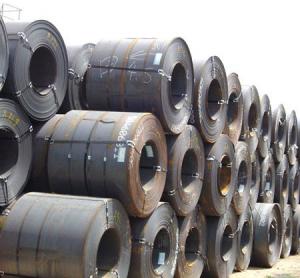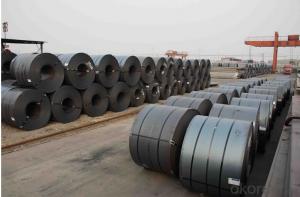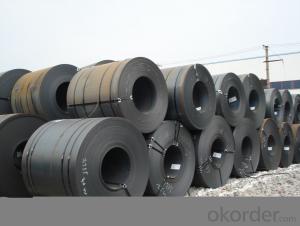HOT-ROLLED STEEL COILS
- Loading Port:
- China Main Port
- Payment Terms:
- TT OR LC
- Min Order Qty:
- -
- Supply Capability:
- -
OKorder Service Pledge
Quality Product, Order Online Tracking, Timely Delivery
OKorder Financial Service
Credit Rating, Credit Services, Credit Purchasing
You Might Also Like
HOT-ROLLED STEEL COIL
Hot rolled low hardness, easy processing, good ductility.
Available specification:
| thickness | width(mm) | length(mm) | coil inside diameter(mm) |
HOT ROLLED STEEL COIL | 1.5-25 | 600-2000 |
| 762 |
HOT ROLLED STEEL STRIP | 1.5-20 | 30-720 |
| 762 |
HOT ROLLED STEEL PLATE | 6-700 | 500-4500 | 4000-18000 |
|
HOT ROLLED STEELSHEET | 1.2-25 | 50-2000 | 0-18000 |
|
we can supply all these inndustrial materials with reasonable price and high quality.
- Q: How do steel coils contribute to fire resistance in buildings?
- Steel coils contribute to fire resistance in buildings primarily due to their material properties. Steel is a non-combustible material, meaning it does not burn or contribute to the spread of fire. It has a high melting point, which helps it retain its structural integrity even under high temperatures. Additionally, steel coils are often used as structural elements in building construction, providing strength and stability to the overall structure. This helps prevent the collapse of the building in case of a fire, providing occupants with more time to evacuate safely.
- Q: What are the different types of steel coil grades and specifications?
- There are several different types of steel coil grades and specifications available in the market. These grades and specifications are designed to meet various industry requirements and applications. Some of the commonly used steel coil grades and specifications are: 1. Hot Rolled Steel Coils: These coils are produced by heating the steel above its recrystallization temperature and then rolling it at a high temperature. Hot rolled steel coils are commonly used in applications where dimensional accuracy and surface finish are not critical. 2. Cold Rolled Steel Coils: Cold rolled steel coils are produced by further processing hot rolled coils through cold reduction mills. This process results in improved surface finish, tighter tolerances, and higher strength compared to hot rolled coils. Cold rolled steel coils are widely used in automotive, construction, and electrical industries. 3. Galvanized Steel Coils: Galvanized steel coils are coated with a layer of zinc to protect them from corrosion. This process, known as galvanization, enhances the durability and longevity of the steel coils. Galvanized steel coils are commonly used in applications such as roofing, fencing, and automotive body parts. 4. Stainless Steel Coils: Stainless steel coils are made from a combination of iron, chromium, and other elements that provide excellent corrosion resistance and high strength. These coils are widely used in industries such as food processing, chemical, and medical, where hygiene and corrosion resistance are critical. 5. High-strength Low-alloy (HSLA) Steel Coils: HSLA steel coils are designed to have higher strength and improved formability compared to conventional carbon steels. These coils are commonly used in structural and transportation applications, where weight reduction and high strength are required. 6. Electrical Steel Coils: Electrical steel coils, also known as silicon steel or transformer steel, are specifically designed for use in electrical equipment such as transformers, motors, and generators. These coils have low core losses and high magnetic permeability, making them ideal for efficient energy transfer. 7. Tool Steel Coils: Tool steel coils are specially formulated to have high hardness, wear resistance, and toughness. These coils are commonly used in the manufacturing of cutting tools, dies, and molds. These are just a few examples of the various types of steel coil grades and specifications available in the market. The selection of the appropriate grade and specification depends on the specific application requirements, such as strength, corrosion resistance, formability, and surface finish.
- Q: Don't ask me why, but I took my stainless steel ring and I heated it up with my gas stove. I stuck it in there til the metal turned red, and the flame which is normally blue turned orange for some reason when the metal turned red. Anyway, afterwards i cooled it off in water and now it's all discolored and it feels different. It's weighs less and it doesn't feel the same. Plus, it's ugly cause it's all black and blue. What happened? Someone help
- My fiancé got a Tungsten wedding band. It's super tough and doesn't scratch. We made sure to get an extended warranty, because those rings can't be resized and otherwise we'd have to pay for a new one. We were thinking about titanium, but it's really light and he just didn't like the feel of it. The tungsten was heavy and felt durable and manly. He also loves the color, it's darker than silver so it looks non traditional. Make sure to get a ring with a curved band for comfort, or he may not like wearing it. Platinum actually scratches easily, so don't even think of it! My fiancé's wedding band was about $250, a bit more with the warranty. Stainless steel will be cheaper, but it's not as durable or scratch resistant as tungsten.
- Q: I need to know how you rate the hardness of steel any ideas?
- For the backyarder to rate hardness, you do a file test. If a smooth file will not mark the steel, it's around 60+RC (Rockwell C scale). If it will mark it with difficulty, the hardness is probably around 56- 58RC. If it will file easily, it's mild steel or is in annealed form, if it is a hardenable steel.
- Q: Is steel cut really better? The nutritional profiles are nealy identical. Which one has the best flavor??Thanks!
- Steel okorder /
- Q: hey therejust wondering about changing nylon strings to steel strings...i have an acoustic guitar and it has nylon strings, but i was thinking about switching to steel strings, as i think it sounds better.this might sound really stupid... but is that possible? i mean they call it a steel stringed GUITAR and nylon stringed GUITAR, so if i wanted to switch would i have to get a whole new guitar? please help, im reaaally confused!thanks
- Steel strings can't go on nylon stringed guitars. So, yes, you have to buy a new guitar.
- Q: How do steel coil manufacturers ensure product quality?
- Steel coil manufacturers ensure product quality through a combination of rigorous quality control processes and adherence to industry standards. Firstly, they start by sourcing raw materials from trusted suppliers who provide high-quality steel. This ensures that the base material used for manufacturing the coils is of superior quality. Manufacturers also implement strict quality control measures during the production process. They employ advanced technologies and machinery to monitor various parameters such as thickness, width, and weight of the coils. This helps in maintaining consistency and accuracy in the dimensions and specifications of the products. To ensure the durability and strength of the steel coils, manufacturers subject them to various tests such as tensile strength testing, yield strength testing, and elongation testing. These tests help in determining the mechanical properties of the coils and ensure that they meet the required standards. In addition to these tests, manufacturers also conduct surface quality inspections to check for any defects or imperfections on the coils. They use techniques like visual inspection, ultrasonic testing, and magnetic particle inspection to identify any surface irregularities that may affect the quality of the product. Furthermore, steel coil manufacturers adhere to international quality standards such as ISO 9001, which ensures that their manufacturing processes are consistent and meet the required quality benchmarks. They also maintain regular communication and collaboration with customers to understand their specific requirements and incorporate any necessary changes to improve product quality. Overall, steel coil manufacturers prioritize product quality through a combination of stringent quality control measures, adherence to industry standards, and continuous improvement practices. This ensures that the steel coils they produce are of the highest quality and meet the expectations of their customers.
- Q: What are the common applications of galvalume steel coils?
- Galvalume steel coils have a wide range of applications due to their unique properties and durability. Some common applications of galvalume steel coils include: 1. Roofing: Galvalume steel coils are commonly used in the construction industry for roofing applications. The coating on these coils provides excellent corrosion resistance, making them ideal for protecting roofs from harsh weather conditions and extending their lifespan. 2. Siding: Galvalume steel coils are also used for siding applications in residential, commercial, and industrial buildings. The durability of these coils makes them suitable for withstanding external elements, such as rain, wind, and sunlight, without corroding or deteriorating. 3. Gutters and Downspouts: Galvalume steel coils are extensively used in gutter and downspout systems. The corrosion-resistant properties of these coils ensure that gutters and downspouts remain functional and aesthetically pleasing for a longer period, saving homeowners from frequent replacements or repairs. 4. Appliances: Many household appliances, such as refrigerators, ovens, and washing machines, utilize galvalume steel coils. The corrosion resistance and high heat reflectivity of these coils make them an excellent choice for manufacturing durable and energy-efficient appliances. 5. Automotive Industry: Galvalume steel coils find applications in the automotive industry for manufacturing parts like body panels, chassis, and exhaust systems. The lightweight nature and corrosion resistance of these coils contribute to fuel efficiency and the overall durability of vehicles. 6. HVAC Systems: Heating, ventilation, and air conditioning (HVAC) systems often use galvalume steel coils for components like ductwork and air handling units. The coils' ability to withstand high temperatures and resist corrosion ensures the longevity and efficiency of HVAC systems. 7. Agricultural Equipment: Galvalume steel coils are used in the manufacturing of agricultural equipment, such as grain storage bins, barns, and sheds. These coils provide excellent protection against rust, ensuring that the equipment remains durable and reliable in agricultural environments. Overall, galvalume steel coils have a wide range of applications across various industries due to their corrosion resistance, durability, and ability to withstand harsh environmental conditions.
- Q: What are the different types of steel coil handling devices?
- There are various types of steel coil handling devices, including coil lifters, coil tongs, coil hooks, coil grabs, and coil carriages.
- Q: I want a stainless steel refrigerator that doesn't leave fingerprints and I'm looking on Lowe's website but they have too many choices and i don't have a clue what they are. The have stainless, stainless look, stainless steel, monochromatic satina, and monochromatic stainless steel. Can anyone tell me what the heck those mean? lol
- RE: stainless steel refrigerator that doesn't leave fingerprints? I want a stainless steel refrigerator that doesn't leave fingerprints and I'm looking on Lowe's website but they have too many choices and i don't have a clue what they are. The have stainless, stainless look, stainless steel, monochromatic satina, and monochromatic stainless steel....
Send your message to us
HOT-ROLLED STEEL COILS
- Loading Port:
- China Main Port
- Payment Terms:
- TT OR LC
- Min Order Qty:
- -
- Supply Capability:
- -
OKorder Service Pledge
Quality Product, Order Online Tracking, Timely Delivery
OKorder Financial Service
Credit Rating, Credit Services, Credit Purchasing
Similar products
Hot products
Hot Searches
Related keywords
